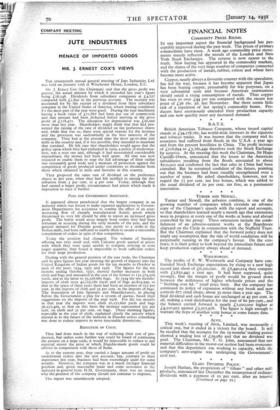COMPANY MEETING
JUTE INDUSTRIES
THE seventeenth annual general meeting of Jute Industries Ltd. was held on January 12th at Winchester House, London, E.C.
Mr. J. Ernest Cox (the Chairman) said that the gross profit was greater, the actual amount by which it exceeded last year's figure being £18,148. Dividends from subsidiary companies at £4,757 compared with £1,892 in the previous account. The increase was accounted for by the receipt of a dividend from their subsidiary company in the United States of America, where trading conditions fir the most part of the year were good. During the year machinery having a book value of £11,867 had been put out of commission and that amount had been deducted before arriving at the gross profit of £118,471. The allocation for depreciation was £20,000 more than last year. Shareholders might think that that had pre- vented the raising of the rate of dividend on the preference shares and, while that was so, there were special reasons for the increase and the provision was undoubtedly in the best interests of the company. They had at the present time the most up-to-date jute mills in the country and, if it was possible, they intended to maintain that standard. He felt sure that shareholders would agree that the policy upon which they had embarked in 1929, a policy of modernisa- tion, was a wise one and, although it had necessitated considerable expenditure, the money had been well spent. All that was now required to enable them to reap the full advantage of their outlay was reasonably good trade and a measure of protection against the competition of goods produced under conditions so dissimilar from those which obtained in mills and factories in this country.
They proposed the same rate of dividend on the preference shares as last year, when they had felt justified in raising the dis- tribution from 3 per cent. to 4 per cent. Today, although they had earned a larger profit, circumstances had arisen which made it imprudent to raise it further.
PLEA FOR GOVERNMENT ASSISTANCE.
It appeared almost paradoxical that the largest company in an industry which was forced to make repeated applications to Govern- ment Departments for assistance to combat the effect of an ever- increasing flow of cheaply manufactured Asiatic goods which threatened its very life should be able to report an increased gross profit. The better result arose largely from orders they had been fortunate in securing during the early months of the year and the general demand for Dundee goods, due partly to a strike in the Indian mills, had been sufficient to enable them to secure a reasonable complement of orders in spite of that competition.
Today the position had changed. The volume of business offering was very small and, with Calcutta goods quoted at prices with which they were quite unable to compete arriving in even larger quantity, they found it impossible to book sufficient orders for their large production.
Dealing with the general position of the jute trade, the Chairman said he gave figures last year showing the growth of imports into the United Kingdom of Indian goods for the ten months to October in each of the years 1934, 1935 and 1936. The figures for the ten months ending October, 1937, showed further increases in both cloth and bags and amounted in the case of the former to 131,374,206 yards, and in the latter to 55,328,665 bags. In 1934 the ten months' imports of cloth were 42,125,280 yards and of bags 40,819,399, so that in the space of three years there had been an increase of 212 per cent. in the imports of cloth and 35 per cent. in the imports of bags. The Association of Jute Spinners and Manufacturers, in placing before the Government a plea for a system of quotas, based their suggestions on the imports of the year 1928. For the ten months in that year the imports were cloth 20,151,600 yards and bags 36,257,400, so that on this basis the increase represented 552 per cent. on cloth and 52 per cent. on bags. These alarming figures, especially in the case of cloth, explained clearly the anxiety which existed as to the future of the industry in Dundee unless something was done to reduce imports to more reasonable dimensions.
REDUCTION OF COSTS.
They bad done much in the way of reducing their cost of pro- duction, but unless some further way could be found of continuing the process on a large scale, it would be impossible to reduce to any material extent the price at which Dundee-made goods could be offered in competition with those of India.
As to the current year, they carried a larger amount of profit on undelivered orders into the new account,. but, contrary to their experience last year, business had been exceedingly quiet for some months. However, the company was in a much stronger financial position and, given reasonable.• trade and some assistance to the industry in general from H.M. Government, there was no reason why the position, of the company should not continue to improve.
The report was- unanimously adopted.






































 Previous page
Previous page